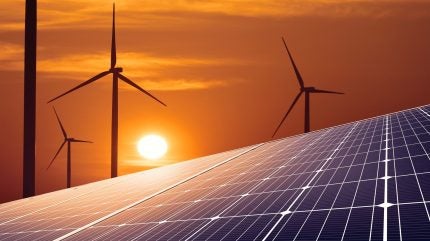
US President Donald Trump’s new tariffs, ranging from 10% to 49% on electrical components, battery storage and other equipment from China, Southeast Asia and Europe, pose significant challenges for the US renewable energy sector, as reported by the Financial Times.
The tariffs could increase costs and disrupt supply chains, impacting the industry’s growth and US clean energy ambitions.
Executives warn that the additional costs from these tariffs could lead to higher electricity bills.
According to the Bank of America, electricity prices already rose at twice the rate of inflation in 2024.
A number of utilities are requesting double-digit price hikes from regulators to offset the increasing costs of labour, materials and grid enhancements.
EDP Renewables North America chief executive Sandhya Ganapathy stated: “This could be a potential de-railer when we really have to usher in this new era of energy dominance to put the US at the epicentre of data centres and AI technology. It is unsettling from a business perspective and creates disruption.”
The Inflation Reduction Act (IRA) and Chips and Science Act, introduced by former US President Joe Biden, aimed to boost domestic manufacturing by offering substantial tax credits.
More than 200 large-scale manufacturing projects have been launched since the legislation passed, though many plants have yet to commence production.
Trump has pledged to dismantle the IRA, referring to it as a “green new scam.” He has suspended permits and loans for certain renewable projects while prioritising the development of fossil fuel initiatives.
This has dampened investment in the green energy sector, which is further burdened by the additional costs associated with sourcing equipment from countries that are subject to punitive tariffs.
Battery storage, crucial for holding renewable energy, is one of the most vulnerable supply chains.
In 2024, more than 90% of lithium-ion energy storage cells used in the US came from China, as reported by data research company Rho Motion.
Despite attempts to boost domestic production in the US, there is insufficient capacity to satisfy demand.
Chinese storage cell imports are now subject to an additional 34% tariff, on top of the earlier 20% imposed by the Trump administration.
In total, existing tariffs on battery storage, the new Trump tariffs and planned increases announced by the Biden administration will increase total duties on Chinese cells to 82.4% by 2026.
Ganapathy stated: “Whether it’s transformers [or] whether it’s circuit breakers, a lot of them are coming from overseas – Canada or Mexico or other parts of the world. And [the imposition of tariffs] not just impacts new projects that we want to put in the ground, it impacts grid stability.”
In contrast, the government of British Columbia in Canada announced in February 2025 that it is fast-tracking 18 mining and energy projects valued at an estimated C$20bn ($13.9bn) in response to tariff threats.
These projects comprise four mines, three natural gas and 11 renewable energy projects, primarily in wind power.


